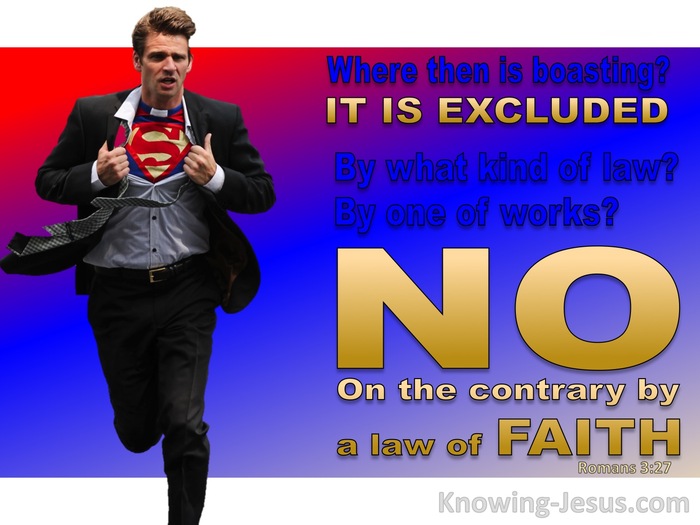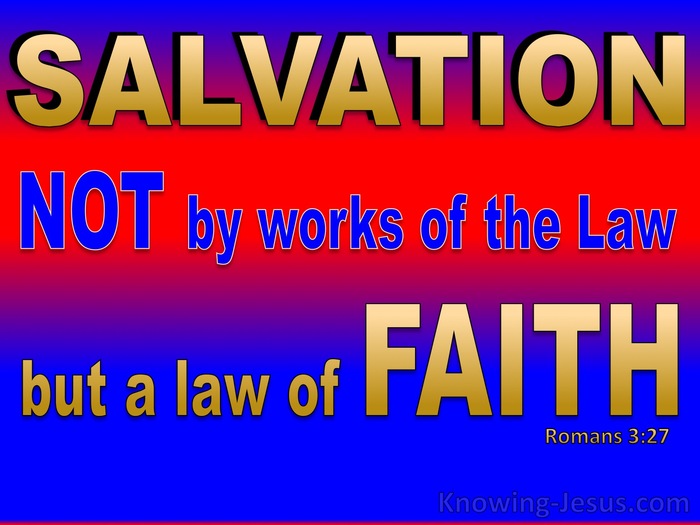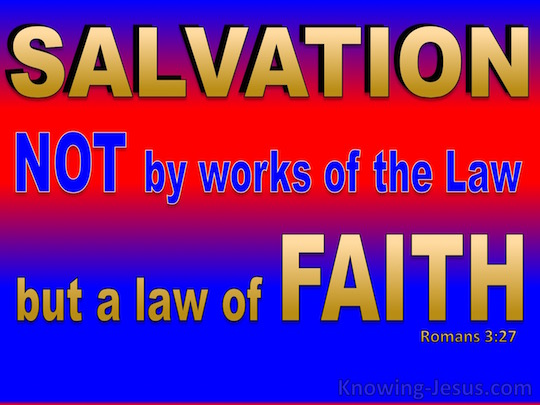Parallel Verses
An Understandable Version
Where then is the [basis for] boasting [i.e., over being right with God]? There is not any. Is it by [obedience to] a law? Is it by doing certain deeds? Not at all, but by a law of faith.
New American Standard Bible
Where then is
King James Version
Where is boasting then? It is excluded. By what law? of works? Nay: but by the law of faith.
Holman Bible
Where then is boasting?
International Standard Version
What, then, is there to boast about? That has been eliminated. On what principle? On that of actions? No, but on the principle of faith.
A Conservative Version
Where then is the boasting? It is excluded. By what law, of works? No, but by a law of faith.
American Standard Version
Where then is the glorying? It is excluded. By what manner of law? of works? Nay: but by a law of faith.
Amplified
Then what becomes of [our] boasting? It is excluded [entirely ruled out, banished]. On what principle? On [the principle of good] works? No, but on the principle of faith.
Anderson New Testament
Where, then, is boasting? It is excluded. By what law? Of works? No; but by the law of faith.
Bible in Basic English
What reason, then, is there for pride? It is shut out. By what sort of law? of works? No, but by a law of faith.
Common New Testament
Where then is our boasting? It is excluded. On what law? On the law of works? No, but on the law of faith.
Daniel Mace New Testament
what reason then is there for boasting? it is excluded. what, by the ceremonial law? no: but by the law of faith.
Darby Translation
Where then is boasting? It has been excluded. By what law? of works? Nay, but by law of faith;
Godbey New Testament
Then where is boasting? It is excluded. By what law? of works? No; but by the law of faith.
Goodspeed New Testament
Then what becomes of our boasting? It is shut out. On what principle? What a man does? No, but whether a man has faith.
John Wesley New Testament
Where is boasting then? It is excluded. By what law? Of works?
Julia Smith Translation
Where then boasting? It was excluded. By what law? of works? No: but by the law of faith.
King James 2000
Where is boasting then? It is excluded. By what law? of works? Nay: but by the law of faith.
Lexham Expanded Bible
Therefore, where [is] boasting? It has been excluded. By what kind of law? Of works? No, but by a law of faith.
Modern King James verseion
Then where is the boasting? It is excluded. Through what law? Of works? No, but through the law of faith.
Modern Spelling Tyndale-Coverdale
Where is then thy rejoicing? It is excluded. By what law? By the law of works? Nay: but by the law of faith.
Moffatt New Testament
Then what becomes of our boasting? It is ruled out absolutely. On what principle? On the principle of doing deeds? No, on the principle of faith.
Montgomery New Testament
Then what becomes of boasting? It is shut out. What sort of law forbids it? A law of works? No, but a law of faith.
NET Bible
Where, then, is boasting? It is excluded! By what principle? Of works? No, but by the principle of faith!
New Heart English Bible
Where then is the boasting? It is excluded. By what manner of law? Of works? No, but by a law of faith.
Noyes New Testament
Where then is the boasting? It is excluded. By what law? of works? Nay; but by the law of faith.
Sawyer New Testament
Where then is the boasting [of the Jew]? It is excluded. By what law? Of works? No; but by the law of faith.
The Emphasized Bible
Where, then, the boasting! It is excluded. Through what kind of law? Of works? Nay! but through a law of faith:
Thomas Haweis New Testament
Where then is boasting? It is excluded. By what law? of works? No: but by the law of faith.
Twentieth Century New Testament
What, then, becomes of our boasting? It is excluded. By what sort of Law? A Law requiring obedience? No, a Law requiring faith.
Webster
Where is boasting then? It is excluded. By what law? of works? No; but by the law of faith.
Weymouth New Testament
Where then is there room for your boasting? It is for ever shut out. On what principle? On the ground of merit? No, but on the ground of faith.
Williams New Testament
So where has human boasting gone? It was completely shut out. On what principle? On that of doing something? No, but on the principle of faith.
World English Bible
Where then is the boasting? It is excluded. By what kind of law? Of works? No, but by a law of faith.
Worrell New Testament
Where, then, is the boasting? It was excluded. By what manner of law? Of works? Nay; but by a law of faith.
Worsley New Testament
Where then is boasting? it is excluded: by what law? of works? no: but by the law of faith.
Youngs Literal Translation
Where then is the boasting? it was excluded; by what law? of works? no, but by a law of faith:
Themes
Interlinear
Dia
Dia
References
Word Count of 37 Translations in Romans 3:27
Prayers for Romans 3:27
Verse Info
Context Readings
Boasting Excluded
26 [In doing this] God [also] demonstrated His justice [to people] of this present time, that He Himself is just and the One who makes the people right with Him who have faith in Jesus. 27 Where then is the [basis for] boasting [i.e., over being right with God]? There is not any. Is it by [obedience to] a law? Is it by doing certain deeds? Not at all, but by a law of faith. 28 For we conclude that a person is made right with God by faith [in Christ], apart from [obedience to] the requirements of a law [or, the law of Moses, See verse 20].
Cross References
Romans 2:23
You boast about having the law of Moses, [but] do you dishonor God by breaking that law?
Romans 4:2
For if Abraham had been made right with God by doing good deeds he would have had something to boast about, but not in God's presence.
1 Corinthians 1:29-31
This was all done so that no human being could boast in front of God.
Romans 2:17
But if you call yourselves "Jews," and [claim to] rely on the law of Moses, and brag about [belonging to] God;
Mark 16:16
The person who believes [i.e., the Gospel] and is immersed will be saved [i.e., from condemnation], but whoever does not believe it will be condemned.
Luke 18:9-14
Then Jesus told this parable to certain ones who were relying on their own goodness and putting everyone else down:
John 3:36
The person who believes in the Son has never ending life, but the person who disobeys the Son will not see life [i.e., will not experience never ending life], but [instead], God's wrath remains on him.
Romans 3:19
Now we [all] know that everything the law says applies to those who are under [obligation to obey] that law, [Note: Here "the law" appears to refer to the Old Testament Scriptures generally, since Psalms and Isaiah are quoted. See verses 10-18]. This is so that the mouth of every objector may be stopped [i.e., from making excuses for his sin], and thereby bring the entire world under God's judgment [i.e., both Jews and Gentiles].
Romans 7:21
So, I find this principle [at work]: [Although] I want to do what is good, evil is [always] present [and often wins out].
Romans 7:23
but I see a different law [at work] in my body, waging [spiritual] warfare against the law in my mind. It brings me into captivity to the law of sin in my body.
Romans 7:25
Thank God [that I can be rescued] through [the power of] Jesus Christ our Lord. So then, I personally [try to] serve God's law with my mind, but [all too often] I serve the law of sin with my flesh [i.e., submitting in weakness to my human desires].
Romans 8:2
For the Holy Spirit's law which provides [never ending] life for those in [fellowship with] Christ Jesus has freed me from the law that requires [spiritual] death for sinning.
Romans 9:11
(OMITTED TEXT)
Romans 9:32
Why? Because they did not [attempt to do it] by faith [in Him], but by trying to fulfill all the requirements [of the law]. So, they stumbled over "the stumbling stone," [i.e., the Jews refused to become obedient to Christ. See I Pet. 2:6-8].
Romans 10:5
For Moses wrote [Lev. 18:5] about a person being made right with God by obeying the requirements of the law of Moses, that he would gain [never ending] life for doing this.
Romans 11:6
And if [they were selected] by God's unearned favor, [then] the choice is not based on the good that people may do. Otherwise, God's favor would not be [really] unearned.
1 Corinthians 4:7
For who makes you different [from each other]? [i.e., with some being viewed as superior and others inferior]. And what do you have that you did not receive [from God]? But if you received it [from Him], then why do you boast as though you did not [receive it as a gift]?
Galatians 2:16
still we know that a person is not justified [i.e., made right with God] by [perfect obedience to] the law of Moses, but rather through faith in [the person and work of] Christ. [Knowing this] we have trusted in Christ Jesus [to save us], so that we might be made right with God by trusting in Him and not by [our compliance with] the requirements of the law of Moses. Because by such law-compliance no one can be made right with God.
Galatians 3:22
But the Scriptures indicate that everything [i.e., everyone] is under the control of sin, so that the promise [of never ending life] could be available [only] to those who have faith in Jesus Christ.
Ephesians 2:8-10
For you have been saved by God's unearned favor, through [your] faith, and that [salvation] was not the result of your own doing; it was the gift from God.
1 John 5:11-12
And this is the testimony [of God]: He gave to us [the hope of] never ending life, and this life is [available through fellowship] in His Son.






